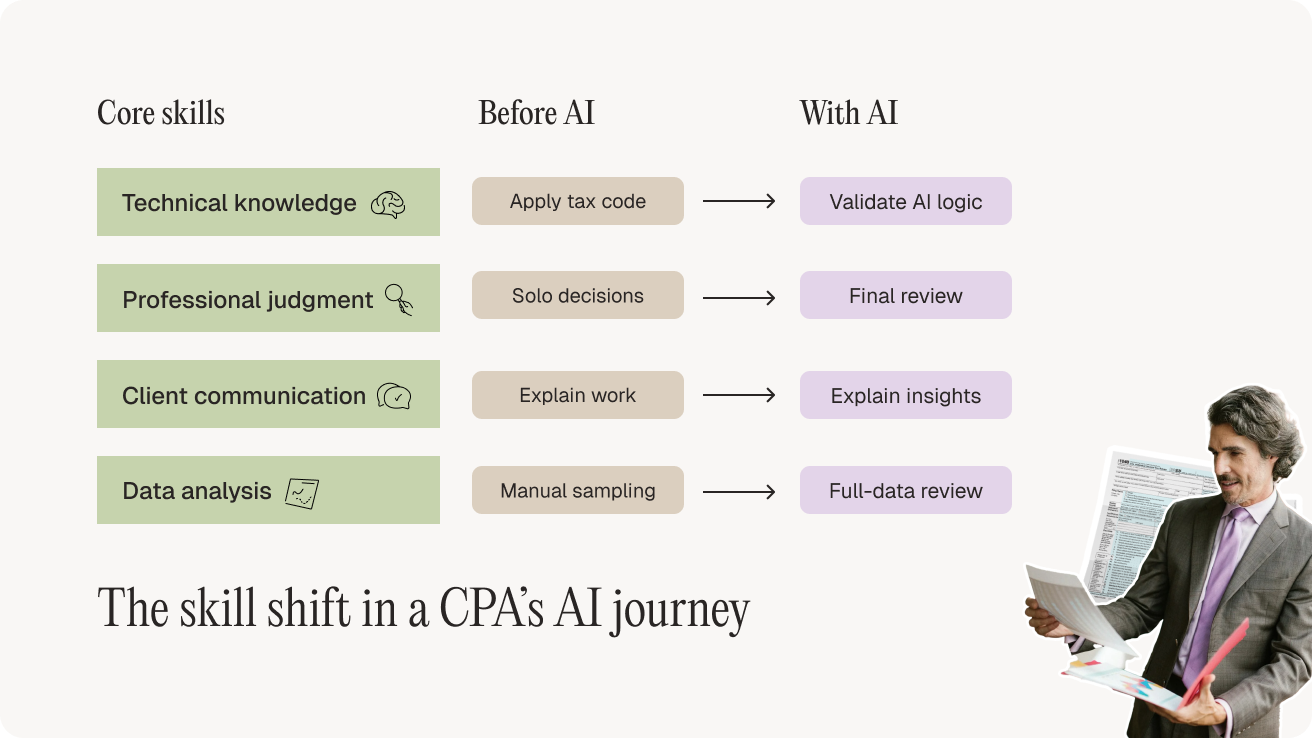AI is transforming accounting at breakneck speed. Manual, repetitive, and seasonal work is giving way to automation that is continuous, intelligent, and insight-driven. For today’s tax firms, the core question is this:
How do you integrate AI without weakening the professional standards that define the CPA role?
The answer lies in competency-based AI. It’s not about replacing CPAs. It’s about pairing the right tools with the professional competencies that matter most—technical accuracy, sound judgment, ethical compliance, data interpretation, and client communication.
When implemented strategically, AI doesn’t replace the professional. It amplifies them.
What is competency-based AI in accounting?
Competency-based AI maps AI tools directly to the high-skill tasks CPAs are trained to do. It’s not about chasing automation for the sake of efficiency. It’s about using AI to uphold, and even strengthen, CPA standards.
Take an example: an AI system extracts W-2 data from a PDF and auto-populates a return. That function boosts technical accuracy and saves time. But the CPA still validates the results, applies judgment, and signs off. AI supports the skill, not replaces it.
Where AI and CPA Skills Align:
- Technical precision: AI trained on current tax law and accounting standards
- Ethical oversight: Automated detection of compliance risks and irregularities
- Data analysis: Pattern recognition across datasets too large for manual review
- Client communication: Converting complex data into clear client-facing insights
This is not hands-off accounting. It’s high-leverage accounting.
Why CPA Core Competencies Must Evolve with AI
Remember when tax season meant drowning in paperwork, endless forms, and calculators? That version of the profession is disappearing. AI now parses documents in seconds, flags issues, and streamlines prep work.
CPA skills aren’t vanishing. They’re evolving. Today’s CPAs are not data-entry specialists. They are strategic reviewers, interpreters, and advisors.

AI hasn’t made CPAs irrelevant. It has made the best ones irreplaceable.
Ethics and compliance in the age of AI
Let’s be clear: CPAs are still responsible. If AI makes a mistake—misses a deduction or flags a false anomaly—the accountability remains with the professional who signs the return.
This makes ethical implementation non-negotiable. It requires:
- Oversight: Understand the AI's scope and limitations
- Verification: Always review the output
- Transparency: Be ready to explain decisions
- Data security: Protect client information with care
Filed ensures human review at every critical point. Accountability isn’t optional—it’s designed into the process.
How to align AI with CPA competencies
1. Audit your workflow
Identify tasks that are:
- Repetitive
- Rule-based
- High-volume
- Low judgment
These are your AI targets. Let AI handle document intake. Save your team for strategy.
2. Integrate AI into tax and audit
AI isn’t just a time-saver. It transforms how you work.
- In audit: Analyze entire datasets, not just samples
- In tax: Auto-organize files, extract structured data, and pre-fill returns
Filed connects directly to the tools you already use—Drake, UltraTax, ProConnect, and CCH Axcess—so you don’t have to reinvent your workflow.
3. Level up your team’s data skills
AI can crunch the numbers. Your team still needs to interpret and communicate them.
Train staff to:
- Spot flawed or inconsistent data
- Use visuals to explain trends
- Translate complex outputs into actionable insights
Think beyond spreadsheets. Focus on what the data actually means for the client.
4. Create feedback loops
AI thrives on feedback. Build in review cycles:
- Weekly: Review wins and misses
- Monthly: Spot trends in AI performance
- Quarterly: Measure gains in efficiency and ROI
Filed helps you close this loop by learning from every return.
.png)
AI literacy and client communication
Your staff doesn’t need to be engineers. But they do need to understand how to explain AI-backed decisions without jargon.
Instead of saying, “The AI flagged a deviation,” say, “Your expenses jumped last quarter. It might be worth reviewing.”
Improve confidence with:
- AI basics workshops
- Roleplaying Q&A with clients
- Communication templates
- Peer feedback reviews
Governance: who owns the output?
Clarify ownership now:
- Who configures and tests the AI?
- Who reviews the results before client delivery?
- Who handles overrides or exceptions?
Keep a pulse on:
- Whether AI is using the most current tax code
- Whether exceptions are being tracked and escalated
- Whether client data is secure
- Whether efficiency goals are being met
Filed makes this easy with built-in transparency and detailed audit trails.
Budget and buy-in: making AI eork for your firm
Worried AI is too expensive? You’re not alone. Many smaller firms think this tech is out of reach.
The reality: cloud-based tools like Filed are designed to scale with your usage. No big upfront costs, just clear ROI.
You’ll see returns in:
- Hours saved per engagement
- Fewer errors and rework
- More clients handled with the same team
- Higher retention and job satisfaction
To get buy-in, bring your team into the process early. Show them how AI frees them from the least enjoyable parts of their jobs so they can focus on high-value work.
Where are we headed?
We’re not moving toward a future without CPAs. We’re moving toward a future where:
- CPAs operate faster
- Make better decisions
- Deliver deeper strategic value
The firms that win will be those that make AI part of their DNA—tools that extend, not replace, professional excellence.
Filed was built to help you do exactly that. Our platform supports CPA judgment while making tax prep smarter, faster, and more scalable.
FAQs: competency-based AI for accountants
How can small firms get started with AI?
Start with one pain point—like document automation. Choose tools that offer usage-based pricing and proven results.
Is client data safe with AI tools?
Yes, when handled properly. Filed uses SOC 2 compliant infrastructure, encryption, and access controls.
Does AI support professional skepticism?
Yes. AI highlights patterns and anomalies. CPAs still verify and make the final call.
What skills should accounting programs focus on now?
Data fluency, AI literacy, communication, and ethical frameworks—alongside traditional tax and audit training.



.png)

